Author: Ava Conway, 4/2/19
I’m sure the barista at Java’s is tired of my instructions by now…“No straw, please,” I say as I order my iced tea and scan the room for an empty seat. As trivial as it may seem, I try to avoid the use of plastic straws whenever possible. It is a small effort to avoid a large-scale production of unnecessary waste contributing to an even larger-scale issue of global warming.

This collection of articles and documentations put out by NASA constitutes the “[Unequivocal] scientific evidence for warming of the climate system” : https://climate.nasa.gov/evidence/
Effects of this global phenomenon include: shrinking ice sheets, glacial retreat, sea level rise, extreme weather, and more. It is difficult to deny the presence of such a phenomenon in modern society, given this overwhelming scientific evidence. And no matter how many plastic straws we avoid, or plant-based meals we cook, we are all contributing members.
However, there remain those who refuse to admit the existence of climate change, and therefore do not act upon its negative societal effects. Here are a few very misinformed tweets by our president, followed by a link with some interesting commentary on what “global waming” really involves:
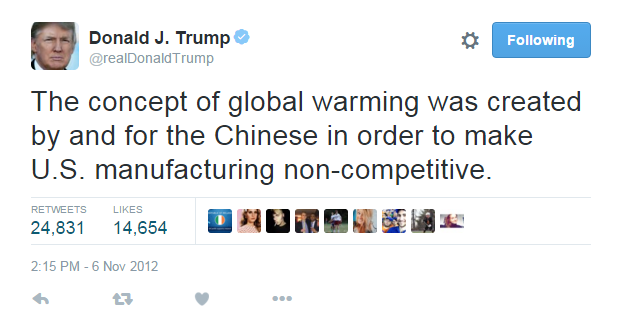
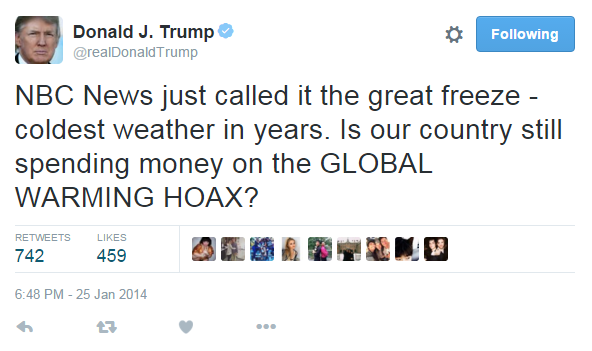
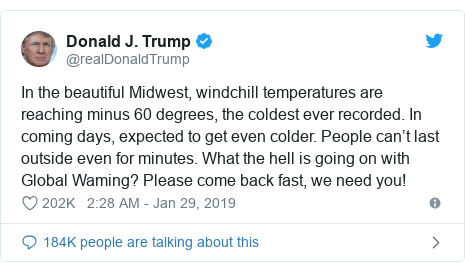
http://time.com/5515340/trump-climate-change-weather/
So how must we tackle this issue of awareness, and how can we encourage a world-wide movement towards sustainability?
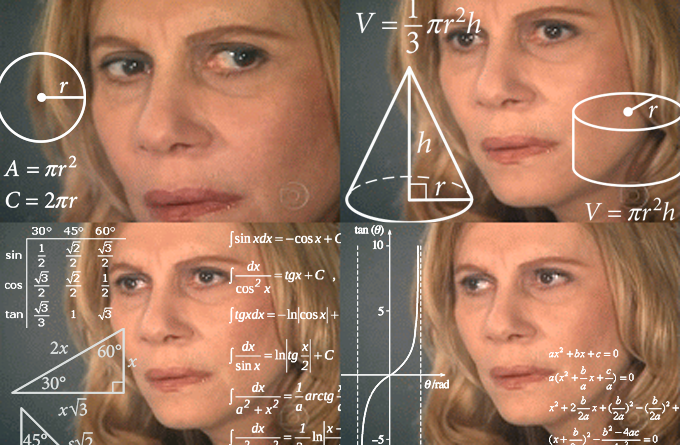
Well, music has always held a very fascinating and powerful connection with the world of politics. There is one piece in particular, Robert Paterson’s 2012 composition “A New Eaarth,” that addresses the issue of climate change particularly well.
Paterson’s title is inspired by a book by Bill McKibeen called Eaarth. McKibben’s book asserts that, because of climate change, the planet we live on today is a different planet than where humans lived centuries ago. Even though it is somewhat recognizable and familiar, it is fundamentally different. The title of my article implies that there is also a difference with the role of the modern orchestra(a). Even though this art form was invented years ago to satisfy wealthy patrons, today’s orchestras hold a unique ability to incite political awareness and change within a community largely divided community. http://robertpaterson.com/a-new-eaarth
Paterson uses somewhat traditional orchestration for this piece. It is written for orchestra, choir, and narrator. The piece opens with an orchestral introduction, followed by a Lennon-esque “Imagine” dialogue with the narrator….
“Imagine a day, perhaps in the future
When we will not worry about the environment.
Imagine a day, perhaps today, or tomorrow,
When our leaders will get together,
Will all get together to fix what is now almost completely beyond repair “
Paterson then writes for the choir to quote famous works of nature-inspired poetry by poets such as Wendell Berry, James Joyce, Percy Bryce Shelly, and William Wordsworth. The lyrics of these poems often portray the serenity of the natural world and its elements. By contrasting these words with harsh fortissimos in the brass section and thoughtful dialogue with the narrator, Paterson’s piece comes across very powerfully as a call to action to save the environment from its destruction.
Futurist composers such as Luigi Russolo would argue that machines create the sounds of daily life of the future. This assertion is very true today, with an abundance of construction of man-made housing, entertainment, and transportation. This transportation in particular is a large contributor towards––you guessed it––carbon emission and climate change. At one point in his score for “A New Eaarth,” Paterson writes annotations for the brass section to mimic car horns. The chaotic and hectic lifestyle of modern life is very accurately portrayed through this effect, and is starkly contrasted with the romantic poetry of peaceful natural landscapes.
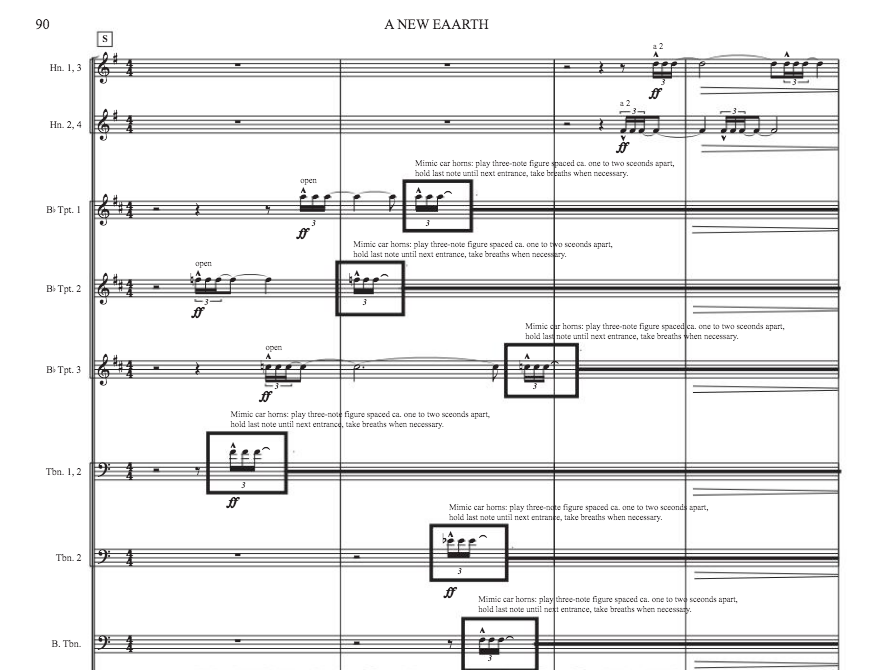

The juxtaposition of romantic poetry and chaotic noise reminds me of the same kind of political satire mentioned in William Robin’s article, “Colin Kaepernick and the Radical Uses of ‘The Star-Spangled Banner.'” Robin mentions an 1844 rewording of the Star Spangled Banner that highlights the corruption and racial hypocrisy within America. I like to think of the above pictured excerpt of “A New Eaarth” to bare a similar kind of rewording of its own poetry…except this time through the addition of music. I would definitely agree with Robin that by presenting familiar material in an unfamiliar setting, the satire of politically-driven art is very meaningful. Find Robin’s article here: https://www.newyorker.com/culture/culture-desk/colin-kaepernick-and-the-radical-uses-of-the-star-spangled-banner
Weaved throughout Paterson’s work is a loose quote famously attributed to the writings of Wendell Berry: “We do not inherit the Earth from our ancestors; we borrow it from our children.” This quote is repeated five times to end the piece, with the SATB choir singing cluster chords. I found this moment in particular to be a very chilling final push towards getting Paterson’s message across. It is the perfect summation of his strive towards a future in which the world treats climate change as a real and present issue. The Earth isn’t something that we get to have for our own; it is something we get to pass off to future generations.

Paterson’s immersion of a political message in his music is very impactful, because music itself is a very moving art form. By conveying his message alongside a well-composed piece of music, it pulls the listener in from a very emotional standpoint. The links of this piece I have provided above are recordings from the 2018 Mostly Modern Festival in Saratoga Springs, NY, and Paterson’s own SoundCloud recordings (from his website). The links are public, so anyone with access to these platforms has the ability to listen to and be affected by this work. This piece is the perfect example of the kinship between music and politics in modern society, because of its introduction of something familiar (an orchestra) through a modern lens (topics of environmental activism). Hopefully, many will have the opportunity to hear Paterson’s message and make strides in the process of counteracting global warming.
Such strides may include, for instance, the recent New York ban on plastic bags, a measure which will decrease the amount of permanent plastic waste production within the state. New York is the second U.S. state to put this policy into effect, next to California, and will hopefully cause a positive trend for other states in years to come. The ban will take effect on March 1st of 2020. Read more here: https://spectrumlocalnews.com/nys/rochester/politics/2019/03/29/new-york-state-plastic-bag-ban-need-to-know-information-lawmakers-albany-budget?cid=share_fb&fbclid=IwAR0g3sNtNqpg-fbvGBQIRwxJOKg9VYbc7OvQLsiGVASNvscumrWtyG0dpI8
Inspired by Paterson’s message, I know I will make sure to pay more attention to the various ways in which I affect the environment and those around me. Here is a link to an article providing advice on how to create a living which reduces one’s carbon footprint and encourages a sustainable lifestyle, something that Paterson advocates throughout “A New Eaarth”: http://www.globalstewards.org/reduce-carbon-footprint.htm
“We need to believe that we can change,
That we can change who we are
And those around us”
-Robert Paterson, “A New Eaarth”

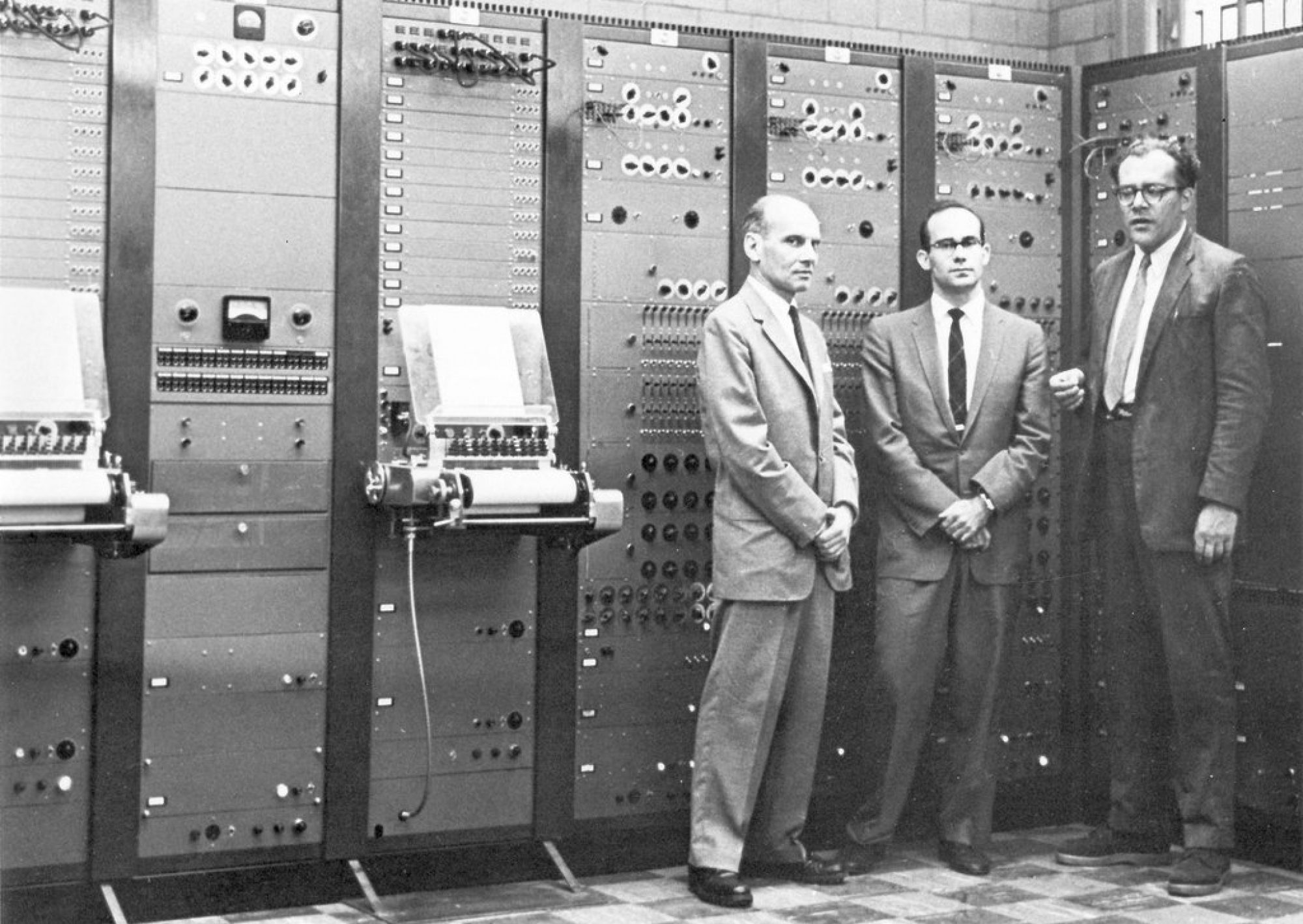
Great Blog Ava! I enjoyed the word play in the title to relate to the piece and also enjoyed the use of the “confused math lady” meme! Your beginning was a great way to introduce your personal actions/opinions toward the topic in question. Similarly, good use of other people’s publicly displayed view on Global Warming. You are doing well to sustain objectivity. All the history that you supplied for the piece itself concerning sources of text and their intended views was a perfect amount of information that would allow the reader to research more, but not be overloaded with too many sources of information. I found it really interesting, whether planned or unplanned, that as I started listening to the recording you supplied, by the time I read to the part about the brass being “car horns”, I heard it in the recording (great planning!). I can tell that you care a lot about this world and I am glad that there are people who do truly value what we do to this earth. While I very much enjoyed your article, I’m not entirely sure what you were arguing, unless you were intending to argue why we should care for the earth. Overall, very motivational writing!